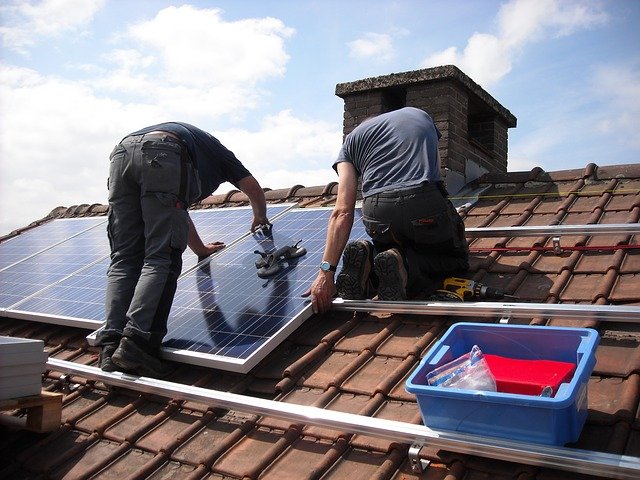<p class="normal">The threats of climate change have incentivized many companies to adopt more eco-friendly measures. A lot can be done to <a href="https://haznos.org/2014/creating-a-sustainable-office-environment/"><span style="color: #1155cc;">create a more sustainable office environment</span></a>, from switching to energy-efficient appliances, to easier remote work set-ups, and bigger investments, such as powering your office with renewable energy.</p>
<p class="normal">Huge conglomerates around the world have made the switch to renewables to power their buildings and equipment. Target, Apple, IKEA, and Walmart, to name a few, have installed solar panels, which helps lower their carbon footprint and save money at the same time.</p>
<p class="normal"><a href="https://www.greenmatch.co.uk/solar-energy/solar-panels#cost"><span style="color: #1155cc;">Solar PV panels use sunlight to generate electricity</span></a>, meaning, in essence, you can get free energy during the day. It may sound implausible for small businesses to go solar, but solar panels do not have to break the bank. With a bit of upfront capital, you can install solar panels and reap long-term benefits, while simultaneously making a positive contribution to climate goals.</p>
<h2><a name="_dm0njsxullvx"></a>Cover Your Electricity Needs During the Day</h2>
<p class="normal">As solar panels need sunlight to generate electricity, using them for your business—during business hours—is an optimal way to get the most out of your solar investment. Your panels can generate the electricity you need then and there, so that you don’t rely on the grid and pay peak hour rates.</p>
<p class="normal">You can effectively eliminate your electricity bills, depending on the amount of energy you require and the size of your system.</p>
<p class="normal">Solar panels can help power anything that requires electricity, from your office equipment, to lighting, to your general utility bills.</p>
<p class="normal">If you run a call centre and have an <a href="https://www.market-inspector.co.uk/telephone-systems/office"><span style="color: #1155cc;">advanced telephone system</span></a> that needs to be active the entire day, you may have high electricity bills currently. But if you invest in solar, you could significantly reduce your costs because you would be powering your phone lines with free electricity.</p>
<h2><a name="_20fxy36lqqu9"></a>Earn Money for Surplus Electricity</h2>
<p><img class="aligncenter wp-image-13256 size-full" src="https://haznos.org/wp-content/uploads/2020/10/solar-2.jpg" alt="How Your Small Business Can Save Money by Going Solar" width="640" height="426" /></p>
<p class="normal">There are a number of grants available for renewable energy in many countries around the world. These incentives have been implemented to encourage the uptake of renewables to help transition towards a cleaner, greener future.</p>
<p class="normal">In the UK, small businesses in particular can benefit from solar panels as they are eligible for the <a href="https://www.ofgem.gov.uk/environmental-programmes/smart-export-guarantee-seg/about-smart-export-guarantee-seg"><span style="color: #1155cc;">Smart Export Guarantee</span></a> (SEG). The SEG came into effect in December 2019, and is a scheme that offers an export tariff for surplus electricity generated by small-scale low-carbon energy technologies, including solar energy.</p>
<p class="normal">The caveat is that these installations cannot have a larger capacity than 5MW, which is why it’s ideal for small businesses. It’s unlikely that your small business will need more than that.</p>
<p class="normal">What the scheme means in practice is that if your panels generate more electricity than you needed on that day, you can export it back to the National Grid and effectively earn money. The tariff does depend on the supplier you partner with, so it’s important to shop around to get the best rates.</p>
<p class="normal">In addition, some energy suppliers under the SEG scheme permit exporting stored energy, so if you have solar batteries, you can also export the electricity at a later date.</p>
<h2><a name="_pcxwxcei46tw"></a>Be Aware of Limitations</h2>
<p class="normal">Naturally, with any investment there are risks and limitations to take into account, too. When purchasing a solar panel, there is a relatively high amount of upfront capital required. Today, a 6kW solar panel system costs £8,000-£10,000, while a 12kW solar panel system costs from approximately £13,000.</p>
<p class="normal">Once installed, though, they require little maintenance and can start already giving you returns on your investment—particularly if you choose to sell electricity back to the grid.</p>
<p class="normal">However, one thing you will not be able to predict or control is the sunlight hours you will get per day. This can lead to different output levels each day. There is a common misconception, though, which is that solar panels need bright light and hot temperatures. In fact, solar panels work optimally in temperate climates and work perfectly fine on cloudy days, too.</p>
<p class="normal">Finally, when you install solar panels on your roof, you’ll understandably be more locked into your location. Therefore, it would be advised to not install solar panels if you plan to relocate offices in the upcoming years. While it’s not an impossible task, you would have to pay an installer to remove them and re-install them on the roof of your new building.</p>
<h2><a name="_ydo3rrfitgo2"></a>Solar Trends Have Made Installations More Affordable</h2>
<p class="normal">Solar panels have been around for a while now. Over the years, technological advancements have made them increasingly affordable, and prices have fallen by a staggering 82% since 2010. It’s likely that prices will fall even more, which can lead to an even more widespread adoption of solar energy.</p>
<p class="normal">Solar panels have high up-front costs, but can provide long-term cost and environmental benefits.</p>

How Your Small Business Can Save Money by Going Solar
